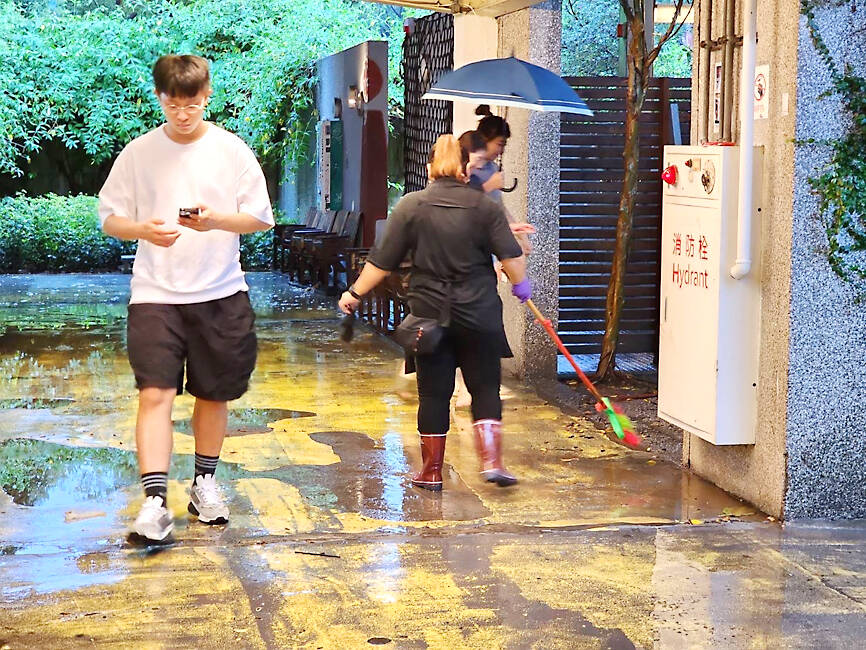The Taipei City Government and subcontractors have been shifting blame and are unwilling to help restaurants and other businesses at Taipei Expo Park that have been affected by severe rain, Chinese Nationalist Party (KMT) Taipei City Councilor Liu Tsai-wei (柳采葳) said yesterday.
Liu said that she received complaints from restaurant and store owners at the site in Zhongshan District (中山) saying their stores had flooded in June, were affected by a leak on Aug. 10 and had water seeping through walls on Sunday.
The owners had spoken to the Taipei Expo Foundation, which manages the park, but it told them it had subcontractors to maintain buildings in the park, Liu said.

Photo courtesy of Taipei City Councilor Liu Tsai-wei
The subcontractors blamed poor construction, and when the owners turned to the Taipei City Government, they were ignored, she said.
The city government should not indulge the subcontractors in such a manner, Liu said.
The foundation had allotted 24 percent, or NT$18.3 million (US$572,985), of its budget for repairs and maintenance in its fiscal 2022 budget, but the owners have been left to deal with water issues, she said.
The restaurants and stores represent the city, and they serve more than 3 million people per year, she said.
The foundation’s finances showed that it was NT$2 million in deficit, she said.
The foundation said that MAJI Square had flooding in a storm on June 30, which was the first time.
It has ordered electric pumps, which arrived yesterday, and flood protection barriers, it said.
The foundation said it was increasing its maintenance budget in fiscal 2023 by NT$2.4 million, adding that it has already negotiated with restaurants regarding compensation.
It said its deficit was primarily due to the COVID-19 pandemic, during which it signed shorter lease terms with some stores and closed one of its pavilions to facilitate construction of a second art museum.
However, revenue at the Expo Park from January to July was more than NT$10 million, it added.

An essay competition jointly organized by a local writing society and a publisher affiliated with the Chinese Communist Party (CCP) might have contravened the Act Governing Relations Between the People of the Taiwan Area and the Mainland Area (臺灣地區與大陸地區人民關係條例), the Mainland Affairs Council (MAC) said on Thursday. “In this case, the partner organization is clearly an agency under the CCP’s Fujian Provincial Committee,” MAC Deputy Minister and spokesperson Liang Wen-chieh (梁文傑) said at a news briefing in Taipei. “It also involves bringing Taiwanese students to China with all-expenses-paid arrangements to attend award ceremonies and camps,” Liang said. Those two “characteristics” are typically sufficient

A magnitude 5.9 earthquake that struck about 33km off the coast of Hualien City was the "main shock" in a series of quakes in the area, with aftershocks expected over the next three days, the Central Weather Administration (CWA) said yesterday. Prior to the magnitude 5.9 quake shaking most of Taiwan at 6:53pm yesterday, six other earthquakes stronger than a magnitude of 4, starting with a magnitude 5.5 quake at 6:09pm, occurred in the area. CWA Seismological Center Director Wu Chien-fu (吳健富) confirmed that the quakes were all part of the same series and that the magnitude 5.5 temblor was

The brilliant blue waters, thick foliage and bucolic atmosphere on this seemingly idyllic archipelago deep in the Pacific Ocean belie the key role it now plays in a titanic geopolitical struggle. Palau is again on the front line as China, and the US and its allies prepare their forces in an intensifying contest for control over the Asia-Pacific region. The democratic nation of just 17,000 people hosts US-controlled airstrips and soon-to-be-completed radar installations that the US military describes as “critical” to monitoring vast swathes of water and airspace. It is also a key piece of the second island chain, a string of

The Central Weather Administration has issued a heat alert for southeastern Taiwan, warning of temperatures as high as 36°C today, while alerting some coastal areas of strong winds later in the day. Kaohsiung’s Neimen District (內門) and Pingtung County’s Neipu Township (內埔) are under an orange heat alert, which warns of temperatures as high as 36°C for three consecutive days, the CWA said, citing southwest winds. The heat would also extend to Tainan’s Nansi (楠西) and Yujing (玉井) districts, as well as Pingtung’s Gaoshu (高樹), Yanpu (鹽埔) and Majia (瑪家) townships, it said, forecasting highs of up to 36°C in those areas